Key takeaways:
- Pro-life advocacy emphasizes the value of every human life and requires collective action to support expectant mothers and families.
- Prioritizing ethical considerations fosters informed, compassionate decisions, impacting the welfare of others and shaping societal norms.
- Real-life advocacy experiences illustrate the emotional complexities of choices surrounding pregnancy, highlighting the importance of listening to personal narratives.
- Effective ethical advocacy involves education, open dialogue, and volunteering to support individuals facing difficult decisions.
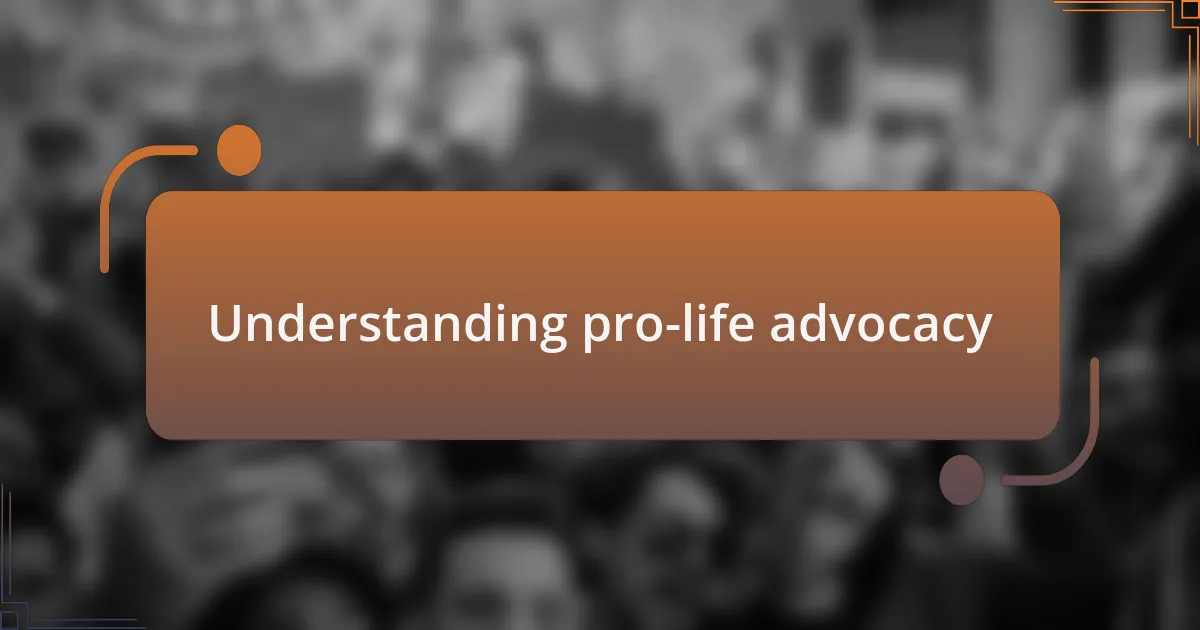
Understanding pro-life advocacy
Pro-life advocacy fundamentally centers on the belief that every human life holds inherent value, from conception to natural death. I remember a time when I attended a neighborhood discussion, where a mother shared her story about choosing life despite facing immense challenges. Hearing her speak so passionately made me reflect on how love and courage can sometimes emerge in the most difficult situations.
At its core, pro-life advocacy isn’t just about opposing abortion; it’s about fostering a culture that embraces life in all its forms. Have you ever considered how societal norms shape our perceptions of what is convenient versus what is ethical? I often find myself questioning whether we prioritize ease over the moral implications of our choices, especially when it comes to something as profound as life itself.
Understanding pro-life advocacy also means recognizing the multifaceted support systems that are essential for expectant mothers and their families. During a volunteer event at a local pregnancy resource center, I witnessed firsthand the incredible impact that empathy and community can have. It opened my eyes to the fact that being pro-life goes beyond a stance; it’s about collective action to ensure that every life is cherished and supported.
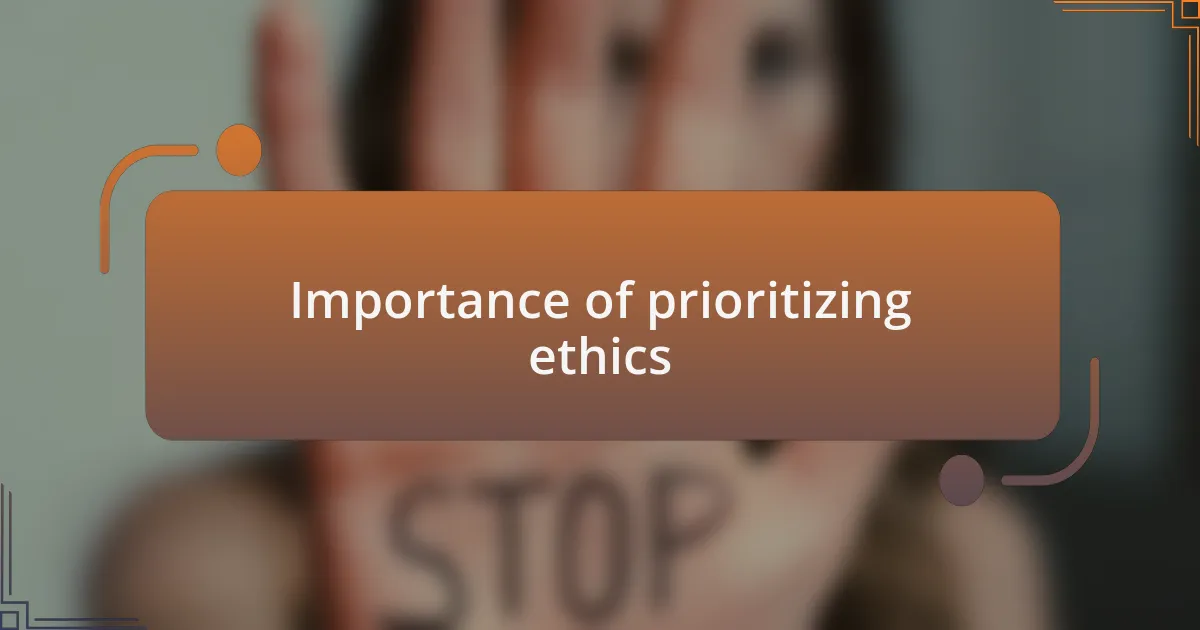
Importance of prioritizing ethics
Prioritizing ethics is crucial because it shapes our actions and decisions, reflecting our core values and beliefs. When we choose to uphold ethical principles, we create a foundation for genuine compassion and responsibility. I remember a time when a close friend faced an unexpected pregnancy; instead of focusing on the convenience of a quick solution, we explored the ethical dimensions of her choices together. That discussion not only deepened our friendship but also reaffirmed our commitment to valuing life.
In a society often driven by convenience, ethical considerations remind us of the gravity of our choices. Have you ever felt the weight of a decision that seemed easier on the surface yet carried significant moral implications? I certainly have, especially when weighing options related to the welfare of others. These moments compel us to confront our responsibilities and the impact our choices have on lives yet to be lived.
Moreover, prioritizing ethics fosters a nurturing environment where people can make informed and compassionate decisions. I recall attending a workshop focused on ethics in healthcare, where stories shared by professionals illuminated the profound difference ethical considerations make in patient care. This experience reinforced the idea that prioritizing ethics isn’t just a personal journey; it’s a communal goal that uplifts everyone involved, encouraging a culture of care and respect.
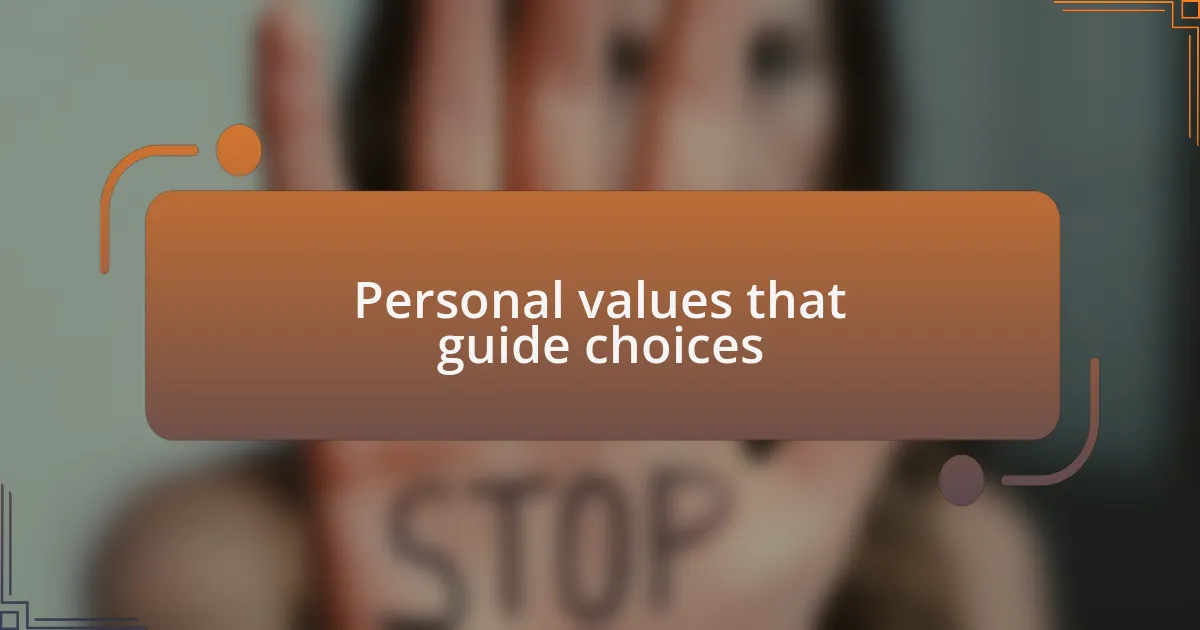
Personal values that guide choices
When I reflect on the values that steer my decisions, I often think about integrity. I once volunteered at a crisis center, where I learned how speaking truthfully can offer hope to those in despair. Witnessing firsthand how honesty shaped my interactions with clients reminded me that being forthright isn’t just about ethics; it’s about building trust and fostering genuine relationships.
Compassion also plays a pivotal role in my decision-making process. I vividly remember a time when I was involved in advocating for a pregnant teenager facing immense pressure to consider an abortion. Instead of suggesting the quick route, I felt compelled to support her and help her see the value of exploring all options. This experience showed me that prioritizing compassion can lead to choices that honor both the individuals involved and the larger ethical narrative surrounding life.
Finally, I believe that accountability influences my choices significantly. There was an instance when I chose to speak out against a pro-choice initiative in my community. While it was an uncomfortable position to take, knowing that I was advocating for a cause I believed in gave me a sense of purpose. Standing firm in my beliefs can be challenging, but I find it deeply rewarding, reminding me that our choices carry weight and can inspire others to reflect on their own values.
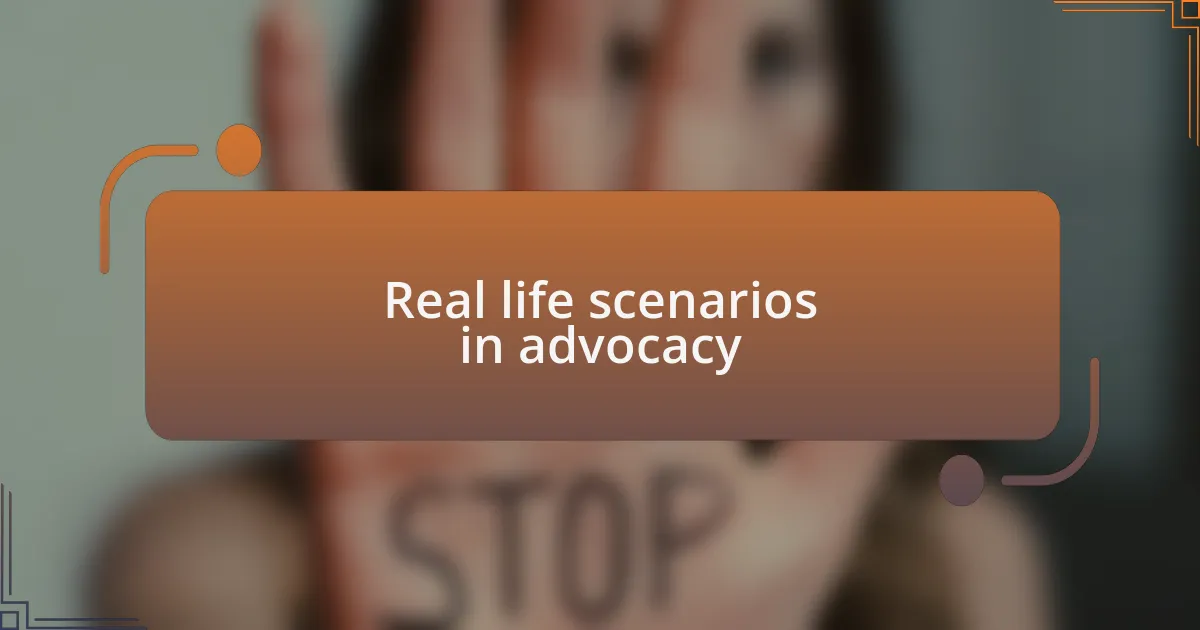
Real life scenarios in advocacy
When I think about real-life scenarios in advocacy, one event stands out vividly. I was at a local rally where a woman shared her story of regret about an abortion she felt pressured into. The raw emotion in her voice struck a chord with everyone present. It made me realize that our advocacy efforts can’t just focus on legislative change; they must also support the emotional journeys of individuals who have faced these choices. How often do we stop to listen to these powerful personal narratives?
Another scenario occurred when I mentored a group of young advocates. One of them faced a dilemma when asked to support a pro-abortion initiative in their college. They were torn between wanting to maintain social acceptance and adhering to their personal beliefs. I encouraged them to reflect on their motivations. Ultimately, they chose to advocate for alternatives, drawing from their own experience of having a supportive family during a challenging pregnancy. It became a moment of profound growth, highlighting how ethics can sometimes create discomfort yet lead to deeper understanding and empowerment.
During a community workshop, I encountered a passionate speaker who was pushing for earlier access to abortions without considering the implications for those involved. As I listened, I felt a surge of responsibility to challenge this narrative, sharing statistics and stories about the emotional aftermath of such decisions. I remember thinking, shouldn’t our conversations reflect the broader impacts on life, not just convenience? These experiences remind me that while advocacy can be tough, it’s vital to prioritize ethics and compassion above all else.
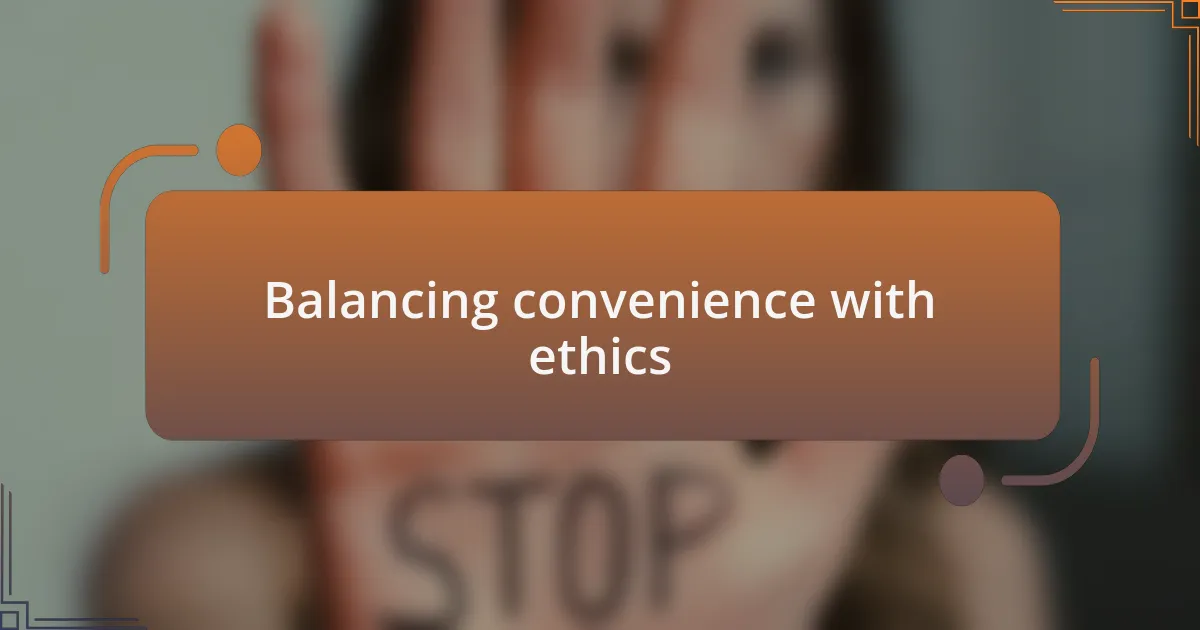
Balancing convenience with ethics
Balancing convenience with ethics is often a challenging endeavor. I recall a time when a friend of mine faced an unexpected pregnancy and considered ending it solely for the sake of convenience. It was heart-wrenching to see her wrestle with such a profound decision, and it made me think—how often do we prioritize ease over the potential for growth and new life? I encouraged her to consider the long-term implications of her choice, not just the immediate relief she sought.
There was another occasion when I attended a panel discussion on reproductive rights, and a speaker argued fiercely for unrestricted access, citing convenience as a primary reason. As much as I appreciated the need for accessible healthcare, I couldn’t help but wonder: what about the ethical responsibility we have toward the lives that could be impacted? This moment sparked a deeper conversation among the attendees, leading us to explore both sides of the issue beyond mere convenience.
Navigating these discussions requires a delicate balance. I often find myself asking advocates: What do we sacrifice when we choose the easy path? In my experience, true advocacy involves embracing discomfort and challenging the status quo. It’s crucial to remember that our choices can ripple out and affect countless lives, reminding us to fully consider the ethical dimensions of our stances.
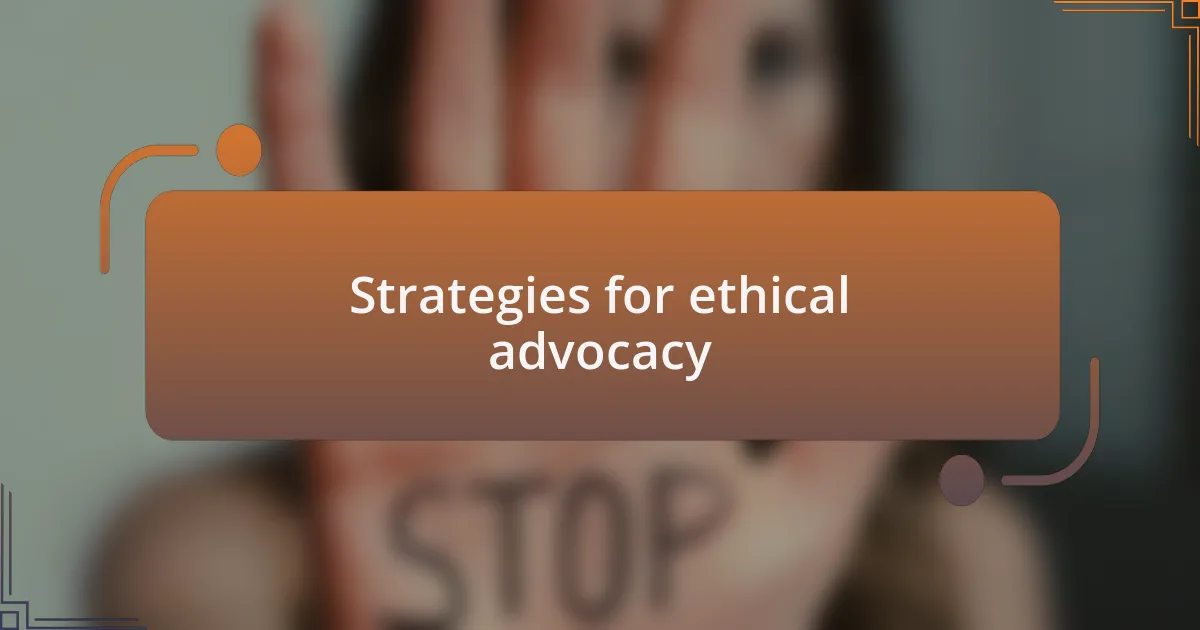
Strategies for ethical advocacy
Engaging in ethical advocacy begins with education and awareness. I once participated in a community workshop where we explored the emotional and psychological impacts of abortion decisions not just on the individuals involved but on families and communities as well. It truly opened my eyes to the often-overlooked consequences of choices made for convenience. This experience taught me that sharing knowledge can empower others to make informed decisions rooted in ethics.
Another effective strategy I’ve seen is fostering open dialogues within our circles. During a local gathering, I facilitated discussions that encouraged individuals to express their beliefs and question the ethics behind their choices. The diverse perspectives shared created a space for genuine understanding and reflection. Isn’t it fascinating how sometimes all it takes is a conversation to shift someone’s viewpoint?
Volunteering with local support networks also plays a vital role in ethical advocacy. I remember dedicating time at a crisis pregnancy center, where I witnessed first-hand the struggles many women face when contemplating their options. It became clear to me that providing support and resources goes beyond mere advocacy; it’s about embodying the values we stand for. By engaging in these activities, we can better assist those in need while promoting a more thoughtful and ethical approach to challenging circumstances.